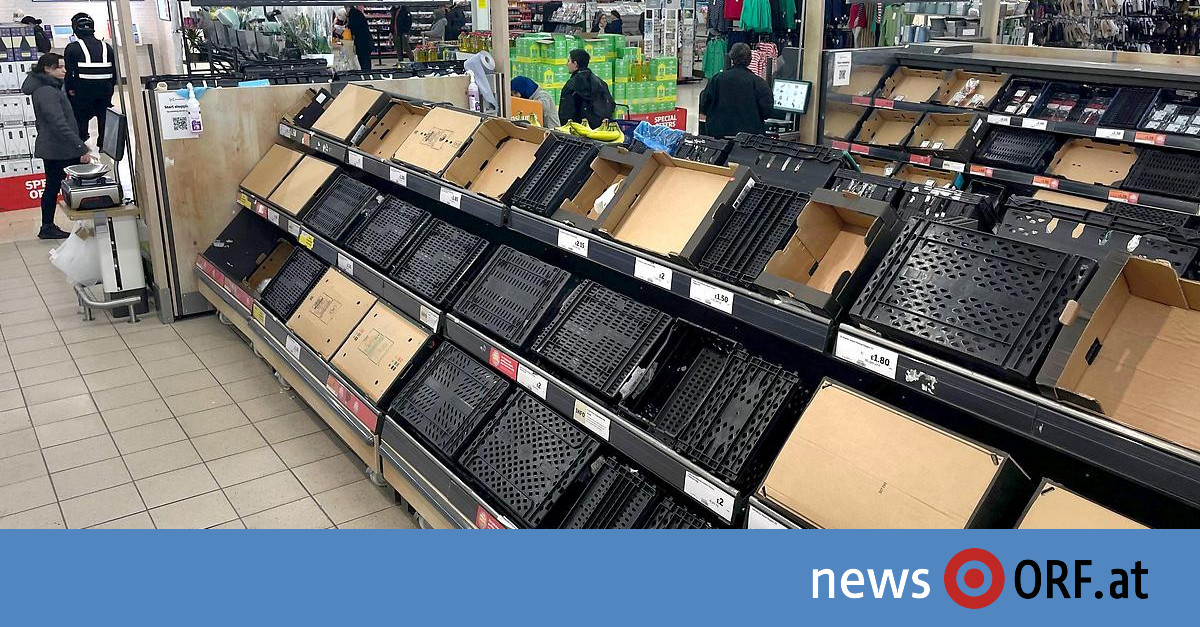Empty supermarket shelves are currently giving many Brits a bitter reminder of the onset of the pandemic. Now, though, supply problems seem home-grown — and they’re on the rise. Several retailers, including market leader Tesco and discount chain Aldi, are already rationing sales of tomatoes and cucumbers due to delivery problems.
According to farmers, apples and pears can also become scarce. Shortages of some fruits and vegetables are just the “tip of the iceberg,” said NFU Vice President Tom Bradshaw on Saturday. “Retailers are doing everything they can to keep costs down during this cost of living crisis.” But farmers and producers may not be able to afford to invest in future production.
Only a third of the trees planted
The Guardian reported that fruit growers have planted just a third of the apple and pear trees needed to support Britain’s 5,500 hectares of production area. According to the apple and pear trade association, the main reason is “grocery store returns that are not sustainable”.
On Friday, British vegetable and fruit producers had already warned of a long crisis due to delivery problems for some foodstuffs. The reasons for the shortage are the unfavorable climate in the growing areas, as well as rising transport costs and energy prices.
Prolonged vegetable crisis warning
British vegetable and fruit producers are warning of a long crisis amid supply problems for some groceries. Some produce won’t be available until May, according to the Lea Valley Growers Association (LVGA). The main reason is the extremely bad climate in the growing areas. Added to this is the increase in transport costs due to high energy prices.
Government sees flaws elsewhere
The Conservative government wants to avoid bottlenecks being blamed on Brexit, although there is some evidence that it is one of the causes. Agriculture Minister Therese Coffey stressed that crop failures due to unusually cold weather in the growing regions of Spain and Morocco were to blame. “We can’t control the weather in Spain,” Minister Coffey told the NFU’s annual meeting. There, however, she had to hear the argument that there were no supply bottlenecks on the European continent.
In general, the Conservatives, who promised even better and cheaper food in their Brexit campaign, are idiosyncratically reacting to their otherwise represented positions and are propagating reduced consumption and regionality: Conservative MP Selaine Saxby suggested not so many foods imported how much in January and February eat salad.
“Let them eat turnips”
“Supermarkets are still importing a lot of produce for us and … we really should be eating more seasonally and supporting our own British farmers,” she said. Coffey repeated, “It is important that we appreciate the specialties that we have in this country.” A lot of people would be eating beets right now and not necessarily thinking about lettuce, tomatoes and the like. “Let them eat turnips,” headlined the traditionally pro-Labour Daily Mirror on Friday, echoing the bread and cake quote attributed to Marie Antoinette.
“If you had told me before I voted for Brexit that it would frost Morocco – then I might have made a different decision,” scoffed Conservative MP Desmond Swayne.
“Blatant political failure”
Clive Black, an analyst at Shore Capital, wrote in a piece published on Thursday that the shortage of lettuce in supermarkets in Britain is due to the Department for Environment, Food and Rural Affairs doing “virtually nothing”, according to The Guardian, to help producers. He saw a “blatant political failure”.
For example, the government excluded vegetable growers from energy subsidies, despite rising electricity and gas prices after the start of the Russian war against Ukraine. The use of greenhouses to grow tomatoes, for example, is no longer worthwhile in winter. “They don’t grow as much here anymore because it’s uneconomical,” Adam Leyland, editor-in-chief of industry publication The Grocer, told the BBC.
Missing Harvest Helpers
Another reason is the lack of seasonal workers who would otherwise travel to harvest from EU countries such as Romania. The reason for this is stricter rules for workers after leaving the EU. Some suppliers have told British media that the higher costs and bureaucracy brought by Brexit have left the country behind when it comes to imports from the EU and Morocco.

